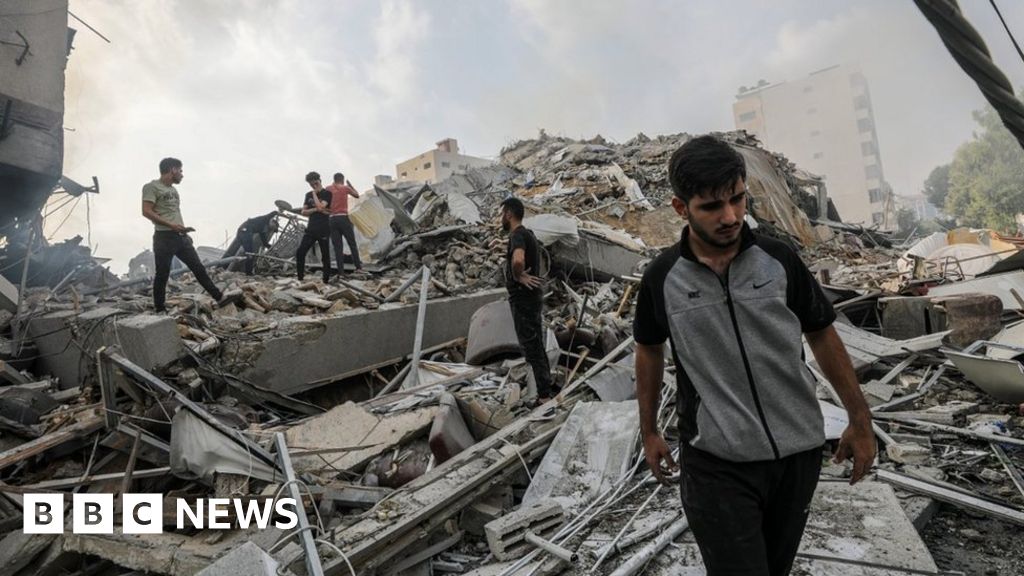On Saturday morning, people in Gaza celebrated after Hamas fired thousands of rockets into Israel and launched deadly cross-border attacks.
A day later, the picture is very different.
After a night of non-stop Israeli shelling, people are staying indoors. Explosions continued throughout Sunday morning.
The sound has been terrifying. Clouds of black smoke have engulfed buildings across the Gaza Strip.
Hamas says 150 targets have been hit since last night. These include military positions, the homes of the militant group's leaders, as well as Hamas-run banks.
One of the more significant Israeli strikes this morning targeted the Watan Tower, which serves as a hub for internet providers in Gaza.
More than 300 people have been killed in the Israeli bombardments and half of the victims are civilians, including women and children, Hamas says.
Most areas are without electricity as Israel has stopped supplying Gaza with power. Gaza's own supplier can only provide 20% of the electricity needed.
Food and water supplies have also been cut.
Driving through the Gaza city centre this morning, I saw rubble blocking roads. Shops were closed, except for a few bakeries where long queues had formed.
The escalation has made Gaza's dreadful humanitarian situation even worse.
Its under-equipped hospitals – which at the best of times struggle to provide healthcare to a population of more than two million people – have launched desperate appeals for blood donors.
Mahmoud Shalabi, Gaza director of the charity Medical Aid for Palestinians, described the city's main hospital as a "slaughterhouse".
Many people were lying on the ground in the emergency department, he said. "There were many dead bodies in the morgue and many medical staff were unable to cope with the huge influx of casualties they were receiving," Mr Shalabi added.
This video can not be played
Missile strikes next to BBC Gaza rooftop base
Later on Sunday, residents in one part of Gaza City received SMS messages from the Israeli army advising them to go to shelter ahead of strikes. More than 20,000 people made their way to United Nations sites in the area, a UN representative told the BBC.
Hamas, which has controlled Gaza for the past 17 years, knows the consequences of attacking Israel – so it must have been expecting such massive retaliatory strikes.
The Iran-backed group has made clear that it is prepared for a war with Israel. Hamas has said it has been smuggling weapons despite the Israeli-Egyptian blockade and developing its own arsenal.
The group has vowed to continue what it calls "retaliatory attacks". After a pause overnight, it said it had fired 100 rockets at the southern Israeli town of Sderot.
Ordinary Gazans express mixed feelings about this unprecedented conflict. Although some saw Hamas' rocket attacks as a cause for celebrations, many are worried that the violence will continue for a very long time.
Are you personally affected by the issues raised in this story? If it is safe to do so, you can get in touch by emailing [email protected].
Please include a contact number if you are willing to speak to a BBC journalist. You can also get in touch in the following ways:
If you are reading this page and can't see the form you will need to visit the mobile version of the BBC website to submit your question or comment or you can email us at [email protected]. Please include your name, age and location with any submission.
Missile strikes next to BBC Gaza rooftop base. Video, 00:00:46
What is happening in Israel, and why now?
More than 250 bodies found at site of Israeli Supernova festival – rescuers
'Nobody could help us' – Shock and anger in Israel's Ashkelon
US moves warships closer to Israel after Hamas attack
How India's first deaf lawyer made history in top court
The scandalous life of a 'dashing and unreliable' king
The 'white gold' rush dividing communities
Biden cannot escape Trump's shadow in border crisis
The inspiring youth orchestra that built itself from nothing
Why Europe is watching Poland's election
Cities under siege as Mali slides towards chaos
An all girls cricket team in India breaks with tradition
How did Israeli intelligence fail to stop major attack?
Why do people love living in Canada?
The return of a divisive lingerie brand
New maps of Earth's lost continent
© 2023 BBC. The BBC is not responsible for the content of external sites. Read about our approach to external linking.
Gaza hospital deluged as Israel retaliation kills and wounds hundreds – BBC

